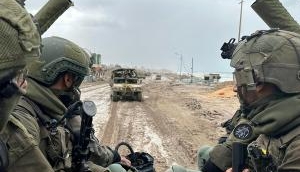Sharif vs Sharif: is Pakistan staring another coup in the face?

Perhaps in no other country in the world are the utterances and the body language of an army chief of such import as in Pakistan.
And when it comes to the appointment of a new chief, or the extension of a current one's service, TV talk shows and the print media go ballistic, each getting 'defence and security' experts to pontificate on the merits or demerits of the issue.
In such a scenario, imagine the escalation in frenzy when hundreds of posters suddenly appear in major cities in Pakistan, including cantonments, calling on the current chief to 'come now,' a thinly disguised euphemism for imposing martial law.
This is what happened recently when in provincial capitals and several other cities, especially in Punjab, posters came up overnight featuring a large photograph of army chief General Raheel Sharif. The posters stated: "Jaanay ki baatein hui puraani, khuda ke liye ab aa jao" ('The talk of leaving is now old. For God's sake, come now).
Who put up the posters?
The posters were put up by Move On Pakistan, a largely unknown political party registered with the Election Commission for the past three years. Its chairman is a Faisalabad-based businessman, Mohammad Kamran, who runs a number of schools and businesses in Faisalabad, Sargodha and Lahore.
In a media interaction, the party's representatives clarified that they were not calling for martial law per se, but for a government of technocrats to be installed by the army chief, to avoid political chaos, since the government and the opposition were on the warpath.
While the PML(N) government stayed silent, it was left to Lt Gen Asim Bajwa of the Inter-Services Public Relations (ISPR), the spokesman of the army, to tweet that the army or any affiliated organisation had nothing to do with the posters.
The same party had also launched a poster campaign in February 2016, requesting the army chief to reconsider his retirement, which is due in November. General Sharif had, on 25 January 2016, made his intentions known through an ISPR tweet that "I do not believe in extension and will retire on the due date." (i.e 28 November 2016).
What was behind the posters?
The posters raised many eyebrows, went viral on social media, and added a touch of intrigue to the Panama Papers travails of the recuperating PM Nawaz Sharif, recently returned from heart surgery in London.
Some tried to link it to the statement of visiting US Senator John McCain, who hoped that General Sharif would continue to lead the Pakistan Army.
The Opposition Pakistan People's Party saw the posters as a ploy by the beleaguered Nawaz Sharif government to create hype that the army could send politicians home in case the Opposition resorted to a street agitation, seeking accountability from the government.
The reference was to the government stalling an inquiry into the Panama leaks, in which the PM's family is implicated.
General Sharif's popularity
In any democratic country, cases would have been registered immediately against anyone seeking to overthrow the Constitution. In Pakistan, however, the government waited till after the ISPR tweeted that the army and its affiliated organisations had nothing to do with the posters, and only then registered a case.
What makes the posters worthy of attention is the fragile state of play between the civil and military leadership, which is frequently masked by the overworked phrase 'they are on the same page'.
The fact that they are not is due to the undoubted popularity of General Raheel Sharif in launching Operation Zarb-e-Azb against some terrorists in Waziristan, as well as tackling the abysmal law and order situation in Karachi.
This contrasts with the almost total abdication of governance by the civilian government of Nawaz Sharif. The most telling example is that during his absence for seven weeks in London for medical treatment, life went on as usual, and barring the TV channels, no one really missed the PM or noted his absence.
However, while General Sharif is being credited with 'changing the narrative' and the 'rules of the game' on terrorism, what needs to be noted is that he is merely clearing the mess that was created by the army itself in search for distant foreign and domestic policy goals in the first place.
Moreover, the action has not been across the board and 'assets' like the Lashkar-e-Tayyeba and the Haqqani network have been spared. Equally, Punjab, the nursery of the jihadi militancy, has been totally overlooked.
The question of national interest
Be that as it may, what stands between democracy and martial law in Pakistan is not only the abysmal economic situation, which is beyond the competence of the army to tackle, but also the character and reputation of the army chief.
Believed to be a man of his word, Raheel Sharif's unequivocal assertion of 'going home' on the due date would make it almost impossible for him to change track now.
The posters, however, are indicative of the yearning of the hapless Pakistani public for an inspired leadership that will take Pakistan out of the morass it finds itself in, coupled with the belief that General Sharif is the man to do it. The danger, of course, is that such kind of adulation can turn even the most resolute professional into believing that he is a man of destiny; that the fate of the nation is in his hands.
In this context, it should be noted that in the ISPR's January tweet, General Sharif had made another significant comment - "Pakistan's national interest is supreme and will be safeguarded at all costs".
In the army's lexicon, 'national interest' is not limited to the security - internal and external - of the state. It extends equally to internal politics. All military dictators - Ayub, Yahya, Zia and Musharraf, seized power in 'supreme national interest' that pertained not to an external threat, but internal disorder.
Add to this the nature of army leadership - that generals don't leave the battlefield till the battle is over. With the battle against terrorism at best half complete, can General Sharif just walk away and hope his successor will follow through? This, together with the outpouring of adulation, makes for a heady cocktail.
Repeating history
The added danger is of Nawaz Sharif trying to repeat history. During his first term as PM, an insecure Nawaz had felt that army chief General Aslam Beg was trying to topple him, and sought to pre-empt the supposed coup. He, thus, appointed Asif Nawaz Janjua as the next army chief four months before the superannuation of Aslam Beg. This effectively made Beg a lame duck chief till he retired on 16 August 1991.
There are stray reports of Nawaz contemplating some such move now to safeguard his own position. Were he to do so, and announce General Sharif's successor prematurely, he could risk creating fissures in the army. This is because unlike Beg, General Sharif is popular among the public and the army. In such a situation, General Sharif could have little option but to protect the institutional interests of the army rather than his own personal credibility.
It is up to Nawaz to ensure that Pakistan does not go down the route of muffled drums yet again.
Edited by Shreyas Sharma
More in Catch
Bargain: Why isn't Gen Raheel Sharif staying on as Pakistan Army chief?
Pak Army uses Panama Papers to put Nawaz Sharif on the mat
Is Pakistan heading towards another military coup after Lahore terror attack?
First published: 20 July 2016, 10:06 IST





![BJP's Kapil Mishra recreates Shankar Mahadevan’s ‘Breathless’ song to highlight Delhi pollution [WATCH] BJP's Kapil Mishra recreates Shankar Mahadevan’s ‘Breathless’ song to highlight Delhi pollution [WATCH]](https://images.catchnews.com/upload/2022/11/03/kapil-mishra_240884_300x172.png)

![Anupam Kher shares pictures of his toned body on 67th birthday [MUST SEE] Anupam Kher shares pictures of his toned body on 67th birthday [MUST SEE]](https://images.catchnews.com/upload/2022/03/07/Anupam_kher_231145_300x172.jpg)






